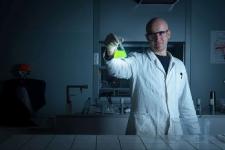Biotech execs in search of human guinea pigs find eager subjects: themselves
By Elizabeth Preston,
STAT
| 07. 07. 2016
When physicist Alex Zhavoronkov looked in the mirror one day and saw alarming swelling around his eyes, he guessed it was an allergic reaction to a drug he’d taken. But he couldn’t just ring up his doctor and ask — the drug was one his own company was developing, and he was its first guinea pig.
As CEO of biotech company Insilico Medicine, Zhavoronkov routinely subjects himself to his own medicine. Self-experimentation lets him quickly see whether lab predictions hold true in a human subject, or whether there are any safety issues — say, a potential allergy. (He now thinks the swelling may have been caused by a drug interaction with some tomato juice he drank.) And he thinks it has a place in the scientific literature, too: He plans to launch a journal of self-experimentation later this year.
Such experiments are one of medicine’s oldest traditions. Many a vaccine or poison was first tested on its developer; most of the earliest work on psychedelic drugs was conducted by intrepid scientists tripping in the name of research. As medicine has progressed, however, self-experimentation has become...
Related Articles
By Julia Métraux, Mother Jones | 02.10.2026
Why was Jeffrey Epstein obsessed with genes? In the latest tranche of Epstein records and emails made available by the Department of Justice, themes of genes, genetics, and IQ—alongside more explicit threads of white supremacy—keep cropping up, often adjacent to Epstein’s...
By Teddy Rosenbluth, The New York Times | 02.09.2026
Dr. Mehmet Oz has urged Americans to get vaccinated against measles, one of the strongest endorsements of the vaccine yet from a top health official in the Trump administration, which has repeatedly undermined confidence in vaccine safety.
Dr. Oz, the...
By Ava Kofman, The New Yorker | 02.09.2026
1. The Surrogates
In the delicate jargon of the fertility industry, a woman who carries a child for someone else is said to be going on a “journey.” Kayla Elliott began hers in February, 2024, not long after she posted...
By Alex Polyakov, The Conversation | 02.09.2026
Prospective parents are being marketed genetic tests that claim to predict which IVF embryo will grow into the tallest, smartest or healthiest child.
But these tests cannot deliver what they promise. The benefits are likely minimal, while the risks to...




